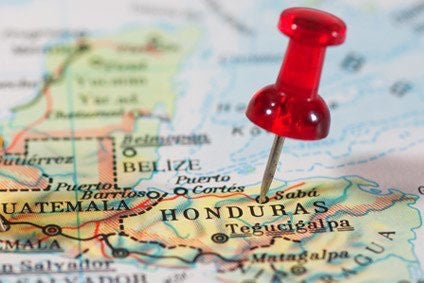
North Carolina State University, Gaston College, and Catawba Valley Community College signed a Memorandum of Understanding (MOU) with Honduran-based Central American Technological University (UNITEC), an initiative which will launch a series of educational workforce development programs, ranging from training and certificate programs to undergraduate and graduate degrees, in textile-related areas of study.
High-level US and Honduran government officials, including: Jose W. Fernandez, Under Secretary of State for Economic Growth, Energy and the Environment; Jennifer Knight, Deputy Assistant Secretary for Textiles, Consumer Goods and Materials at the US Department of Commerce; and Hector Zelaya, private secretary to Honduran President Xiomara Castro, participated in a roundtable discussion with textile executives and educational leaders as well as the MOU signing ceremony.
The partnership comes at a defining moment for the US, Honduras and Central America, which are seeing historical levels of investment in textile and apparel production stemming from a global supply chain crisis that has driven a significant shift in sourcing out of Asia to the US and the region.
Nearly $1bn of historic textile and apparel investment is anticipated in the US and Central America this year alone. And this partnership also creates an educational pathway to economic opportunity in Honduras and the region that not only creates a skilled and resilient workforce but can also help to address the root causes of irregular migration.
Current growth projections indicate a need for more than 10,000 new skilled workers in the textile industry in Honduras alone over the next five years. In order to meet these needs, educational programming is needed at all levels.
The US and this region are inextricably linked through a textile and apparel co-production chain under the US-Central America-Dominican Republic Free Trade Agreement (CAFTA-DR) that has generated $12.6bn in annual two-way trade in the sector and supports 1m workers in the US and the region. Industry experts say CAFTA is a growing opportunity for the US.

US Tariffs are shifting - will you react or anticipate?
Don’t let policy changes catch you off guard. Stay proactive with real-time data and expert analysis.
By GlobalDataNorth Carolina plays a central role in this co-production chain. It is the second largest state for textile employment nationally with over 36,000 workers, and the state’s $2.7bn in textile-related exports leads the nation. The Northern Triangle, including Honduras, is a major export destination for US yarns and fabrics that come back as finished items under the US-CAFTA-DR trade agreement.
David Hinks, Dean of the Wilson College of Textiles, North Carolina State University, commented: “Together we will train the next generation of textile workers, leaders and academics in this critical production chain. These workforce programs will have a ripple effect throughout Central America, the region and the United States, spurring job growth and more investment, and not just in textiles and apparel. Hundreds of our industry partners that work with our college closely are looking to re-engineer their supply chains out of China to the United States and Central America. This new partnership will provide a near seamless educational and training pathway to building an even stronger textile and apparel co-production chain between the US and CAFTA-DR countries, which collectively supports 1.1m workers.”
Under secretary Fernandez added: “The United States is very supportive of the academic partnership announced here today which will lead to increased opportunities in co-production and will benefit both the United States and Central America. Investment in workforce and adherence to strong labour standards and good labour practices are essential to creating sustainable and resilient supply chains.”
Deputy assistant secretary Knight, said: “As we work to create more sustainable and resilient global supply chains, this sector is in a window of opportunity. “The innovations that US and Central American textile and apparel companies create to reduce environmental impact and increase transparency across their supply chains can set them apart from global competitors, and today’s workforce development initiative is a key element in turning this vision into reality.”
National Council of Textile Organizations (NCTO) president and CEO Kim Glas said: “This partnership demonstrates the critical need for education and training programs for the next generation of academics and textile employees to meet head-on the global sourcing shift that has been driving production out of Asia to Honduras, the entire CAFTA-DR region and the United States. Collaboration on this scale will support our critical co-production chain in the CAFTA-DR region and further enhance investments for the years to come. US and Honduran government support for this private sector collaboration is crucial. We sincerely appreciate the statement of support issued by the State Department, as well as the participation in today’s events by Under Secretary Fernandez, Deputy Assistant Secretary Knight and Secretary Zelaya. It’s important these efforts are supported and funded in order to help expand growth opportunities in the US and Central American textile and apparel production efforts. This is an exciting time for our industry.”



